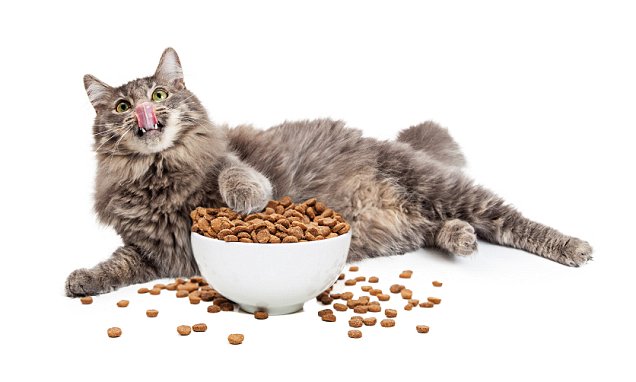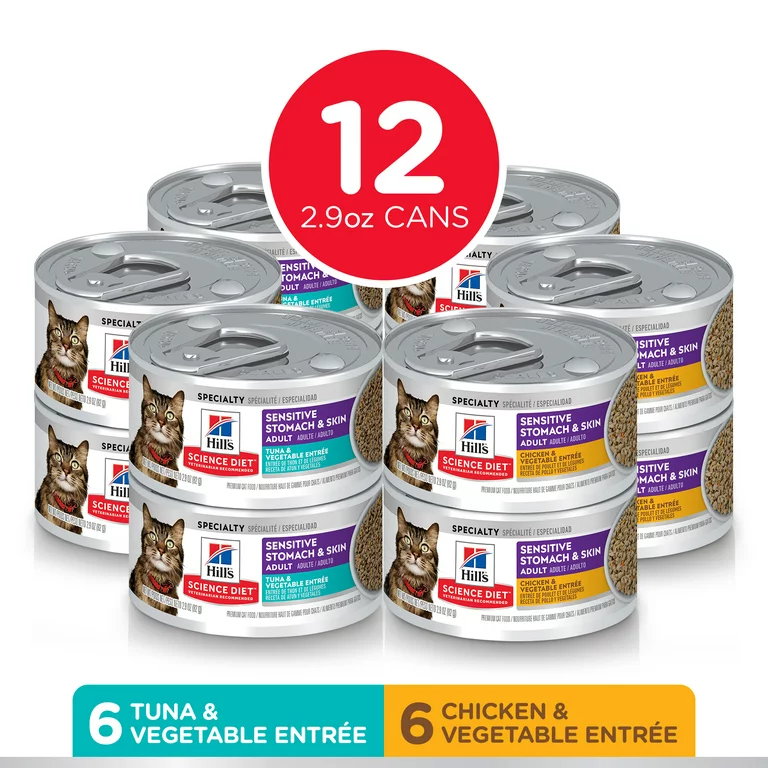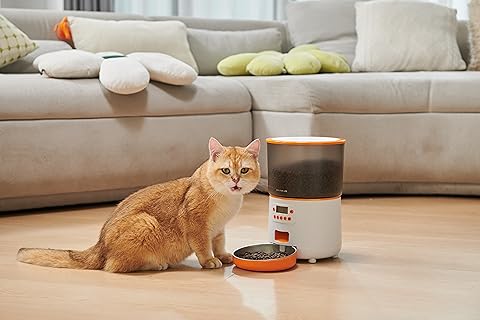Why choose soft cat food over dry or wet options?
Health benefits of soft cat food for your feline friend
Tips for transitioning your cat to soft food
Different types of soft cat food available on the market
Precautions to take when feeding your cat soft food

“Soft Cat Food Discover the Your Feline Friend”
is not only easy for cats to chew and digest, but it also provides them with essential nutrients they need to thrive. Whether your cat is a picky eater, has dental issues, or simply prefers a softer texture, can be a great option to keep them healthy and satisfied.
Additionally, many are formulated to meet specific dietary needs, such as hairball control, weight management, and urinary tract health, making it easier for you to address any concerns your cat may have. Stay tuned as we explore the numerous benefits of soft cat food and why it may be the perfect choice for your beloved feline friend.
Why choose soft cat food over dry or wet options? Health benefits of soft cat food for your feline friend Tips for transitioning your cat to soft food Different types of soft cat food available on the market Precautions to take when feeding your cat soft food
Why choose soft cat food over dry or wet options?
Soft cat food offers a myriad of benefits for your furry feline friend that you may not have considered. While both dry and wet cat food have their own advantages, soft cat food provides a unique combination of benefits that can contribute to your cat’s overall health and well-being.
One of the main reasons to choose soft cat food over dry or wet options is its palatability. Soft cat food typically has a smoother texture and more appealing taste compared to dry kibble.
This can be especially beneficial for picky eaters or older cats who may have trouble chewing harder foods. The soft texture of canned cat food can make it easier for your cat to eat and enjoy their meals, which can help encourage a healthy appetite.

In addition to being more palatable, soft cat food is also often more hydrating than dry cat food. Wet cat food has a higher moisture content, which can help keep your cat hydrated, especially if they do not drink enough water on their own.
Adequate hydration is essential for your cat’s overall health, as it helps support proper kidney function and can prevent urinary tract issues. By choosing soft cat food, you can help ensure that your cat is getting enough fluids in their diet.
Soft cat food may also be easier for cats with dental issues or sensitive teeth to eat. If your cat has dental problems, such as missing teeth or gum disease, they may struggle to chew hard kibble. Soft cat food typically requires less chewing, making it a more gentle option for cats with dental issues.
Additionally, the high moisture content of soft cat food can help keep your cat’s mouth hydrated and may reduce the risk of dental problems in the future. Another benefit of soft cat food is its nutrient density. Canned cat food is often formulated to be more nutrient-dense than dry kibble, as it can contain higher levels of protein, vitamins, and minerals.
This can be especially important for cats with specific dietary requirements, such as kittens, senior cats, or cats with certain health conditions. By choosing soft cat food, you can provide your cat with a balanced and nutritious diet that meets their individual needs.
Finally, soft cat food can offer convenience for pet owners. Canned cat food typically comes in single-serve portions that are easy to open and serve, making mealtime simple and hassle-free.
You can also easily mix medications or supplements into soft cat food, which can be helpful if your cat has certain health issues that require additional supplementation. In conclusion, soft cat food offers a variety of benefits for your feline friend that may make it a preferred option over dry or wet cat food.
From its palatability and hydration properties to its dental benefits and nutrient density, soft cat food can provide your cat with a balanced and healthy diet that supports their overall well-being. Consider incorporating soft cat food into your cat’s diet to provide them with a meal that they will love and that will help keep them healthy and happy.
Health benefits of soft cat food for your feline friend
As a responsible pet owner, you always want to make sure that your feline friend is getting the best nutrition possible. When it comes to choosing your cat’s food, you may have wondered about the benefits of feeding them soft cat food. Soft cat food, also known as wet or canned food, can offer numerous health benefits for your furry companion.
One of the main advantages of soft cat food is its moisture content. Cats are notoriously bad at drinking enough water, which can lead to health issues like urinary tract infections and kidney disease.
Soft cat food has a much higher moisture content than dry kibble, helping to keep your cat well-hydrated and promoting healthy kidney function. This can be especially important for older cats or those with kidney issues. Soft cat food is also highly palatable, making it a great option for picky eaters or cats with dental issues. Cats can be finicky eaters, and some may turn their noses up at dry kibble.
The moist and flavorful texture of soft cat food can entice even the pickiest of eaters to chow down. Additionally, cats with dental problems, such as missing teeth or gum disease, may have difficulty chewing hard kibble. Soft cat food provides an easy-to-chew option that is gentle on your cat’s teeth and gums.
Another benefit of soft cat food is its high protein content. Cats are obligate carnivores, which means they require a diet high in protein to thrive. Soft cat food is often made with high-quality animal proteins like chicken, turkey, or fish, providing your cat with the essential nutrients they need to stay healthy and strong.
Protein is crucial for muscle development, immune function, and overall wellbeing, making it an essential component of your cat’s diet. In addition to protein, soft cat food is also rich in essential vitamins and minerals.
Many canned cat foods are formulated to provide a balanced and complete diet, ensuring that your cat receives all the necessary nutrients for optimal health. From vitamin E for skin and coat health to taurine for heart function, soft cat food can help keep your cat in top shape.
Soft cat food can also be beneficial for cats with digestive issues or sensitivities. The soft texture of canned food is easier for cats to digest than dry kibble, making it a great option for cats with sensitive stomachs or gastrointestinal problems.
Additionally, some soft cat foods are formulated with limited ingredients or novel proteins, making them suitable for cats with food allergies or intolerances. While soft cat food can offer numerous health benefits for your kitty, it’s essential to choose a high-quality brand that meets your cat’s specific dietary needs.
Consulting with your veterinarian can help you determine the best diet plan for your feline friend based on their age, activity level, and any health concerns they may have.
By incorporating soft cat food into your cat’s diet, you can help support their overall health and wellbeing for years to come.
Tips for transitioning your cat to soft food
Transitioning your cat to soft food can be a great choice for their overall health and well-being. Whether you are switching from dry food to soft food for the first time or simply trying to introduce a new brand or flavor, there are some tips to keep in mind to make the transition as smooth as possible for your feline friend. First and foremost, it is important to make the switch gradually.
Abrupt changes in your cat’s diet can lead to digestive upset, including diarrhea and vomiting. Start by mixing a small amount of the new soft food with their current dry food. You can gradually increase the proportion of soft food over the course of a week or so until your cat is fully transitioned to the new diet.
It is also a good idea to choose a high-quality soft cat food that meets your cat’s nutritional needs. Look for options that are made with real meat as the first ingredient and are free from artificial additives and fillers.
Your veterinarian can help you select the best soft food for your cat based on their age, weight, and any specific health concerns they may have. When introducing the new soft food to your cat, be patient and observant. Some cats may take to the new food right away, while others may be more hesitant.
If your cat seems reluctant to try the soft food, you can try warming it up slightly to enhance the aroma and make it more appealing. You can also try offering the food at different times of the day or in a different location to see if that makes a difference.
It is important to monitor your cat’s weight and overall health throughout the transition to soft food. Some cats may experience weight gain when switching from dry to soft food, as soft food typically contains more moisture and calories.
Keep an eye on your cat’s body condition and adjust their portion sizes as needed to maintain a healthy weight. In addition to transitioning your cat’s diet gradually, it is also important to provide them with plenty of fresh water. Soft food contains more moisture than dry food, but it is still important for cats to stay well-hydrated.
Make sure your cat always has access to clean, fresh water to drink.
By following these tips and being patient and observant, you can successfully transition your cat to soft food and provide them with a nutritious and delicious diet. Your feline friend will thank you for it with their happy purrs and healthy body.
Different types of soft cat food available on the market
When it comes to feeding your feline friend, soft cat food is a popular choice among pet owners. Soft cat food comes in various forms and textures, providing your cat with a range of options to tantalize their taste buds. From canned wet food to pouches and trays, there are plenty of options available on the market for your furry companion.
One popular type of soft cat food is canned wet food. Canned wet food is typically moist and contains higher water content compared to dry food, making it a great choice for cats who may struggle to stay hydrated or have dental issues. Canned wet food also tends to have a stronger aroma and flavor, which can be appealing to picky eaters. Pouches are another type of soft cat food that has gained popularity in recent years.
Pouches are convenient for pet owners as they are easy to store and serve. They come in a variety of flavors and textures, including pate, chunks, and gravy, providing your cat with a diverse range of options to enjoy. Tray-style soft cat food is another option for pet owners looking to feed their cat a moist and delicious meal. These trays typically come in single-serving portions, making them convenient for pet owners who want to feed their cat a fresh meal without having to worry about leftovers.
Soft cat food also comes in specialized formulas for cats with specific dietary needs. For cats who struggle with hairballs, there are soft cat foods that contain added fiber to help reduce hairballs and promote digestive health. There are also soft cat foods formulated for cats with allergies, sensitive stomachs, dental issues, or weight management needs.
Additionally, some soft cat food brands offer grain-free options for pet owners looking to feed their cats a diet free of grains and fillers. Grain-free soft cat food is often made with high-quality proteins, vegetables, and fruits to provide your cat with a balanced and nutritious meal. Overall, there are plenty of options available on the market when it comes to soft cat food.
Whether you prefer canned wet food, pouches, trays, or specialized formulas, there is a soft cat food option out there to suit your cat’s individual tastes and dietary needs. Consider trying different types of soft cat food to see what your feline friend enjoys the most and provides them with the nourishment they need to live a healthy and happy life.
Precautions to take when feeding your cat soft food
Feeding your furry feline friend soft cat food can be a great choice for many reasons. It can be easier for them to digest, especially for older cats with dental issues or digestive problems.
Soft cat food also tends to have more moisture content, which is important for keeping your cat hydrated and preventing urinary tract issues. However, there are some precautions to keep in mind when feeding your cat soft food.
First and foremost, it’s important to choose a high-quality soft cat food that is specifically formulated for cats. Look for a brand that uses real meat as the first ingredient and does not contain fillers or artificial additives.
Portion control is also crucial when it comes to feeding your cat soft food. It can be easy to overfeed your cat when they’re gobbling up their favorite moist meal, but too much food can lead to weight gain and obesity.
Make sure to follow the feeding guidelines on the packaging or consult with your veterinarian to determine the appropriate portion size for your cat’s age, weight, and activity level.
Additionally, it’s important to monitor your cat’s weight and overall health when feeding them soft food. Regularly weigh your cat and keep an eye out for any changes in their appetite, energy levels, or litter box habits.
If you notice any concerning changes, it’s best to consult with your veterinarian to rule out any underlying health issues. Another important precaution to take when feeding your cat soft food is to properly store and handle the food.
Soft cat food can spoil quickly if left out at room temperature for too long, so it’s important to refrigerate any leftovers and discard any uneaten food after a certain amount of time. Wash your cat’s food dishes regularly to prevent bacterial growth and always wash your hands before and after handling their food. Lastly, it’s important to remember that soft cat food should not be the only type of food in your cat’s diet.
While soft cat food can be a convenient and nutritious option, it’s important to also provide your cat with a balanced diet that includes a mix of dry food, wet food, and treats.
This variety can help ensure that your cat is getting all of the nutrients they need to stay healthy and happy. In conclusion, feeding your cat soft food can be a beneficial choice for many reasons, but it’s important to take certain precautions to ensure that your feline friend stays healthy and happy.
By choosing a high-quality soft cat food, monitoring portion sizes, keeping an eye on your cat’s weight and overall health, properly storing and handling their food, and providing a balanced diet, you can help ensure that your cat thrives on their soft food diet.
In conclusion, soft cat food offers numerous benefits for your feline friend. From easier digestion to dental health and hydration, choosing soft cat food can help support your pet’s overall well-being. So next time you’re shopping for cat food, consider giving soft cat food a try and see the positive impact it can have on your furry companion.

